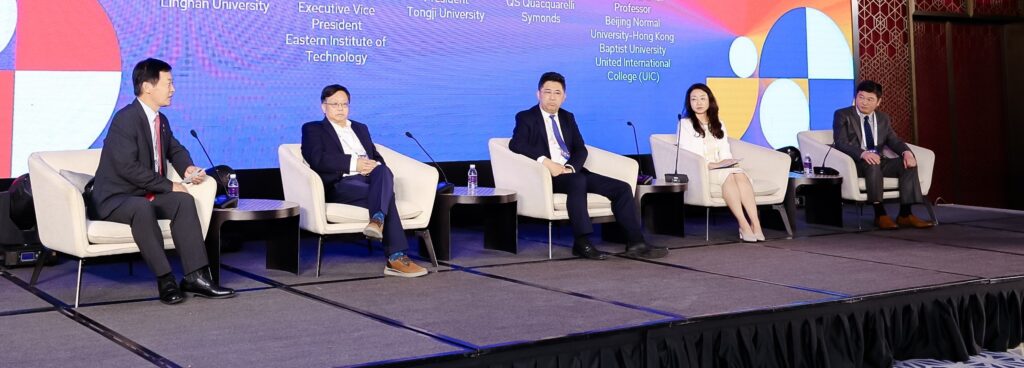
We know many Chinese students utilise AI for learning and creativity. Universities are used to adapting – it’s time to do so again, and to understand how to utilise new technologies according to experts at the QS China Summit 2024. During the Summit, higher education leaders highlighted the significance of Chinese universities using innovative digital pedagogical techniques to improve its standing in the global education arena.
41% of Chinese students consider ‘up-to-date technology’ as a factor when evaluating a university’s teaching quality.
QS International Student Survey 2023
A panel discussion titled, ‘Fostering Distinction in Chinese Higher Education Through Digital Innovation’ explored the topic – while also tackling the challenges associated with embracing new technological advancements in education.

What opportunities does Generative AI offer to revolutionise the curriculum?
“We think that this is an opportunity to transform our curriculums to prepare our students for the digital innovation in the new realm and at our university, we’ve designed our lab to adopt AI”, said Professor Zhang Dongxiao, Provost and Executive Vice President at Eastern Institute of Technology.
On the other hand, Professor Zhang also feels that it will be a challenge to adopt AI into university education. “Let’s say you’ve assigned an essay to the class. How can the professor tell which one is done by the student and not ChatGPT?”
“We’ve lost the ability to do calculations in our head,” Professor Zhang remarked, transitioning to his next point about the skillsets he believes we are on the verge of losing.
“It first became that you have a calculator so now we don’t need an abacus. Then of course, you don’t even need a calculator because you have a mobile phone. Even for the simplest maths, we just use our phones without even trying anymore. If we’re using AI and asking them to input keywords to create a whole new paragraph moving forward, we will soon lose our ability to write.”
“I really think if we use AI well, it can help to improve the overall teaching quality.”
Professor Lyu Peiming, Executive Vice President at Tongji University
Professor Lyu Peiming, Executive Vice President at Tongji University on the other hand, has a more optimistic view.
“I see new opportunities for universities as we can use the information technology to monitor how students learn and progress. Also, I believe teachers can change their teaching methodology to improve the efficiency and effectiveness of teaching for them. For the university administrators, we can then monitor the overall progress of students and faculty members. I really think if we use AI well, it can help to improve the overall teaching quality.”
Professor Lyu also shared that in his experience as Human Resource Manager, he has observed that many faculty members may be somewhat traditional in their approach and slower to adapt to changes compared to students. However, with the transformation underway and the external pressure they are facing, they will be encouraged to innovate and better serve their students.
The future of tech degrees in China
Professor Joe Qin, President of Lingnan University, provided insight into the current availability of tech-based course materials in China:
“Five years ago, when I was looking at the number of data-science related programmes approved by the Ministry of Education in China, there were over 2,000 programmes being approved in a two-year span.”
Given China’s rapidly evolving higher education landscape, as it integrates new AI-driven skills into the curriculum, is there a risk that AI could eventually become more cost effective and convenient than computer science? Will we see the number of these courses reduce or even disappear as a result?
“I don’t think these majors would need to disappear,” Professor Qin says, “but they would need to take on a different form, particularly with the way they create experiences. The challenge we have now is how do we speed up our capacity to provide the needed talents for society?”
QS Senior Consultant, Alice Wei Wei gave insight from the QS perspective. “If you look at the QS World University Rankings by Subject 2024 every year or every other year, we’re still introducing new subjects into the rankings. For instance, last year we introduced rankings for Data Science & Artificial Intelligence, highlighting our recognition of the important of this field. It is also important to note that the addition of new subjects has not led to the removal of any existing subjects from our rankings.
“In addition, QS believes that digital innovation plays a crucial role in higher education. The history of education development shows that technology and education evolve together.
“In recent years, the vast potential of digital technologies, especially advancements in artificial intelligence, is being fully unleashed, offering new opportunities and challenges for reshaping educational models and fostering innovation. Accelerating the innovative application of technology in higher education may ultimately ensure educational equity and enhance the overall quality of education.
“I think, to achieve these goals, instead of working in siloes, universities need to work together, sharing resources, co-developing initiatives and leveraging collective strengths and expertise. This approach can foster a more interconnected academic community and accelerate the adoption of innovative practice. Overall, collaboration is always more effective than working on your own.”
Discover how QS is using AI to improve the student admissions process for universities, and students.



